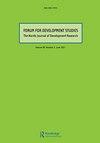里约奥运会前的城市转型政治:以公民为中心和以市场为中心的议程之间的争论与冲突
IF 1.1
Q3 DEVELOPMENT STUDIES
引用次数: 1
摘要
摘要本文以城市升级计划(PAC Favela)为视角,考察奥运会前里约热内卢新自由主义城市发展的背景动态和形式。批判性学术界认为,里约的创业治理和大型活动引发的例外状态推动了新自由主义的城市议程。虽然没有拒绝这种总体叙事,但本文认为,这种趋势是由不同规模的背景政治形成的,产生了多样化的城市发展形式。在联邦层面,卢利斯莫(2002年至2016年工人党政府的政治意识形态)领导下的城市政策和实践以实现社会和经济转型的雄心为标志。PAC增长加速计划对贫民窟升级的投资就是这一雄心的象征。通过对社区、州和联邦层面的社会和经济利益以及参与者在里约罗辛哈贫民窟与政治行动委员会接触的多尺度案例研究,文章表明,政治行动委员会的干预是以公民和市场为中心的城市议程之间争论和融合的结果。尽管平衡逐渐转向以市场为中心的新自由主义议程,但结果仍应被视为内在的混合。一方面,罗辛哈的PAC案例提供了一个“从下面”的视角,并对奥运会前里约热内卢城市转型的竞争性和矛盾性提供了重要的见解。此外,它还说明了对被认为是去政治化的新自由主义创业型城市治理和发展进行背景分析的必要性。本文章由计算机程序翻译,如有差异,请以英文原文为准。
Politics of Urban Transformation in Pre-Olympic Rio de Janeiro: Contentions and Confluences Between Citizen- and Market-centred Agendas
Abstract This article uses an urban upgrading programme (PAC Favela) as a lens for examining the contextual dynamics and forms of neoliberal urban development in pre-Olympic Rio de Janeiro. Critical scholarship has contended that Rio’s entrepreneurial governance and mega-event induced state of exception pushed forward a neoliberal urban agenda. While not rejecting this overarching narrative, the present article argues that this tendency was shaped by contextual politics at different scales, producing variegated forms of urban development. At the federal level, urban policy and practice under lulismo – the political ideology characterizing the 2002–2016 Workers’ Party governments – was marked by an ambition to achieve both social and economic transformation. The PAC Growth Acceleration Programme’s investments in favela upgrading were emblematic of this ambition. Through a multi-scalar case study of the social and economic interests and actors at the community, state and federal levels that engaged with PAC in the Rocinha favela in Rio, the article shows that PAC’s interventions were the outcome of contentions and confluences between citizen- and market-centred urban agendas. While the balance gradually shifted in favour of the market-centred, neoliberal agenda, outcomes should still be seen as inherently hybrid. On the one hand, the case of PAC in Rocinha presents a perspective ‘from below’ and important insights into the contested and contradictory nature of urban transformation in pre-Olympic Rio de Janeiro. Furthermore, it illustrates the necessity for contextual analyses of perceived de-politicized neoliberal entrepreneurial urban governance and development.
求助全文
通过发布文献求助,成功后即可免费获取论文全文。
去求助
来源期刊

FORUM FOR DEVELOPMENT STUDIES
DEVELOPMENT STUDIES-
CiteScore
1.80
自引率
14.30%
发文量
24
期刊介绍:
Forum for Development Studies was established in 1974, and soon became the leading Norwegian journal for development research. While this position has been consolidated, Forum has gradually become an international journal, with its main constituency in the Nordic countries. The journal is owned by the Norwegian Institute of International Affairs (NUPI) and the Norwegian Association for Development Research. Forum aims to be a platform for development research broadly defined – including the social sciences, economics, history and law. All articles are double-blind peer-reviewed. In order to maintain the journal as a meeting place for different disciplines, we encourage authors to communicate across disciplinary boundaries. Contributions that limit the use of exclusive terminology and frame the questions explored in ways that are accessible to the whole range of the Journal''s readership will be given priority.
 求助内容:
求助内容: 应助结果提醒方式:
应助结果提醒方式:


